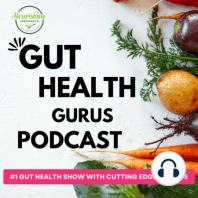43 min listen

Professor Ted Dinan on The Psychobiotic Revolution: Mood Food and the New Science of The Gut Brain Connection
Professor Ted Dinan on The Psychobiotic Revolution: Mood Food and the New Science of The Gut Brain Connection
ratings:
Length:
54 minutes
Released:
Jan 25, 2019
Format:
Podcast episode
Description
Kriben Govender (Honours Degree in Food Science & Technology) and James Shadrach (Honours Degree in Psychology) interview the father of Psychobiotics, Professor Ted Dinan. We discuss how the gut and brain is connected, and the future of probiotics, prebiotics and food as a treatment option for IBS, anxiety, depression, stress and mood management. Bio: Ted Dinan is Professor of Psychiatry at University College Cork. He was previously Chair of Clinical Neurosciences and Professor of Psychological Medicine at St. Bartholomew’s Hospital, London. Prior to that, he was a Senior Lecturer in Psychiatry at Trinity College Dublin. He has worked in research laboratories on both sides of the Atlantic and has a PhD in Pharmacology from the University of London. He is a Fellow of the Royal Colleges of Physicians and Psychiatrists and a Fellow of the American College of Physicians. His main research interest is on the role of the gut microbiota in influencing brain function and development. Within this context he has focused on depression and irritable bowel syndrome. He has made significant contributions to the literature on the regulation of the hypothalamic-pituitary-adrenal axis in situations of stress. In 1995 was awarded the Melvin Ramsey Prize for this research into the biology of stress. His current research is funded by Science Foundation Ireland, the Health Research Board and the European Union through FP7. He has published over 400 papers and numerous books on the pharmacology and neurobiology of affective disorders. Research interests: The “Brain-Gut-Microbe Axis” research addresses the communication between the brain and gut and how it can be influenced by the gastrointestinal microbiota. This is an area of significance in infancy, where important links between diet, microbes and cognition are established. The influence of the microbiota on obesity and metabolic syndrome are also increasingly recognised. A better understanding of the role of this axis in the stress response, and its links with other debilitating psychiatric conditions, will help provide new treatment and management strategies – these will represent opportunities for both the food ingredients business and the pharmaceutical industry. Within this context papers Prof. Dinan’s group have promoted the concept of Psychobiotics, probiotics that have a mental health benefit. Professional activities: Prof. Dinan runs a clinic for treatment refractory depression at Cork University Hospital. The research focus at this clinic is on biomarkers of response and the development of new therapies. Publications: Please see http://orcid.org/0000-0002-2316-7220 Topics discussed: Brain Gut - Microbiome Axis What are Psychobiotics? Modulating the gut Microbiome to treat psychological disease and improve mental health Species of Psychobiotic bacteria Probiotic health claims European Food Safety Standard for claiming health benefits of probiotic Food industry issues on probiotic health claims Convergence of Food and Pharma Treatment options for Mental health issues How the Gut and Brains are connected? Bi- directional Vagus communication Bacterial communication via the vagus nerve Importance of short chain fatty acids via Fibre Tryptophan metabolism Synthesis of Tryptophan by gut microbiota Immune system cytokines and brain activity Decline of Bifidobacteria with age The effect of Bifidobacterium longum 1714 on tryptophan levels and mood https://www.ncbi.nlm.nih.gov/pubmed/27801892 Mechanism of tryptophan and stress The impact of elevated and sustained Cortisol Reduction of Cortisol by Bifidobacteria Cushing’s disease Cortisol and Depression Future prospect of improving cardiovascular health with Psychobiotics The impact Birth Method on asthma, allergies, antibiotics, obesity and stress response Antibiotics and Depression Early life Antibiotics use and Obesity Risk Impact of Anti- Depressants on gut
Released:
Jan 25, 2019
Format:
Podcast episode
Titles in the series (61)
Beating Anxiety & Depression via Gut Health: Natural Strategies to deal with Anxiety and Depression including Gut Health by The Gut Health Gurus Podcast